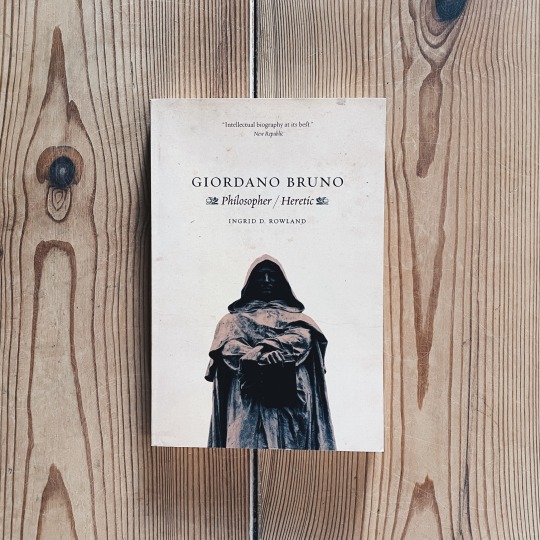#giordano bruno
Text
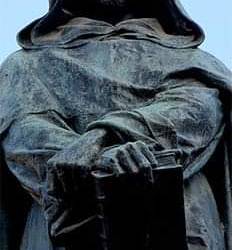
Maiori forsan cum timore sententiam in me fertis quam ego accipiam.
Non mi vergogno d'aver sopportato la povertà, la malevolenza e l'odio dei miei, le esecrazioni, le ingratitudini di coloro ai quali volli giovare e giovai, gli effetti d'un'estrema barbarie e d'un'avarizia sordidissima. Per il che non mi duole d'esser incorso in fatiche, dolori, esilio: ché faticando profittai, soffrendo feci esperienza, vivendo esule imparai: ché trovai in breve fatica lunga quiete, in leggera sofferenza gaudio immenso, in un angusto esilio una patria.
Giordano Bruno, 17 febbraio 1600, Campo de' Fiori, Roma
39 notes
·
View notes
Text
Divinity reveals herself in all things, everything has divinity latent within itself. For she enfolds and imparts herself even unto the smallest beings, and from the smallest beings, according to their capacity. Without her presence nothing would have being, because she is the essence of the existence of the first unto the last being.
The Expulsion of the Triumphant Beast
Giordano Bruno
50 notes
·
View notes
Text
Because our knowledge is ignorance, or because it is neither knowledge of anything there nor the understanding of any truth, or because even if there is some entrance to that [truth], the door may not come open except by means of ignorance — which is simultaneously path, gatekeeper, and gate.
Giordano Bruno, from The Cabala of Pegasus
17 notes
·
View notes
Text
«Sul finire del Sedicesimo secolo la volta celeste si alzava, come la vediamo noi ancora oggi, non di venti metri come nel planetario, ma circa a non più di trenta chilometri sopra di noi, come un’inflessibile costruzione. Sopra questa fortezza celesta troneggiava il malefico Dio, la cui vista penetrava in tutti gli errori degli uomini, che puniva senza pietà con la guerra, la peste, gli incendi. La volta celeste, che sosteneva i palazzi e i giardini di Dio, cingeva come un guscio d’uovo la Terra liberamente sospesa nel vuoto.
«A questo punto entrò in scena Giordano Bruno e ruppe il guscio dell’uovo cosmico aprendo lo sguardo meravigliato e felice dell’umanità sull’infinità dello spazio. Le stelle fisse non erano più i bottoni dorati inchiodati all’immobile parete celeste, ma divennero barche dorate che si muovevano liberamente nell’etere a grande distanza le une dalle altre. Tutta la magnificenza dei palazzi divini si era volatilizzata. Se fossi un grande artista come lei», disse lo zoologo volgendosi ora al pittore, «progetterei un affresco imponente che, come contraltare del Giudizio Universale di Michelangelo, raffiguri Giordano Bruno sul rogo. Ma le fiamme, che devono bruciarlo, salgono verso il cielo e incendiano la volta celeste come fosse una misera quinta teatrale. Si vedrebbero quindi la città di Dio con i suoi opulenti palazzi crollare, dissolvendosi nel fumo e nella cenere, e insieme ad essi cadrebbero vittime dell’eterna distruzione angeli e santi. In lontananza, le stelle dell’Orsa Maggiore, come sfere luminose, apparirebbero in segno di vittoria.»
Jakob von Uexküll, L'immortale spirito nella natura, traduzione dal tedesco di Nicola Zippel, Castelvecchi (collana I Timoni), 2014. [Libro elettronico]
[Edizione originale: Der unsterbliche Geist in der Natur, Christian Wegner Verlag, Hamburg; testo pubblicato in tre parti fra il 1938 ed il 1947]
#libri#letture#leggere#saggi#saggistica#Giordano Bruno#Jakob von Uexküll#scienza#scienze#conoscienza#biologia#libertà di pensiero#Nicola Zippel#astronomia#teologia#atei#libero pensiero#ateismo#etologia#ecologia#agnosticismo#libertà di parola#agnostici#umwelt#ambiente#percezione#filosofi#filosofia#fenomenologia#semiotica
12 notes
·
View notes
Text
Is it just me, or does Pedro Pascal look remarkably like Giordano Bruno, the 16th century Italian scientist that insisted that not only did the Earth orbit the Sun, but that stars could be other suns with their own planets, and who was burned at the stake for this "heresy"?
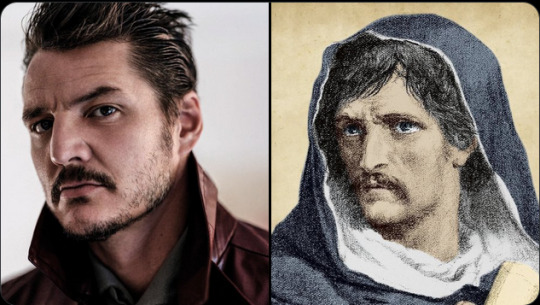
(Notably, that wasn't the only heresy Giordano Bruno was burned for. He also questioned eternal damnation, the virginity of Mary, and believed souls probably transmigrate/reincarnate.)
85 notes
·
View notes
Text

“The idea of man as a microcosm, expressed so many times in the philosophical and mystical literature of old and new times, nowhere receives such an in-depth interpretation as in Kabbalah”.
— S. N. Bulgakov “Non-Evening Light”
“Sciences such as theology, philosophy and mathematics take their principles and roots from it [Kabbalah]. Therefore all these sciences (scientiae) are subordinate to this wisdom (sapientia); and their principles and rules are subordinate to her principles and rules; and therefore their argument is insufficient without it”.
— R. Lull “Works of Raymond Lull”
“Kabbalah gives the highest principle an unpronounceable name; from it she derives, in the form of an emanation of the second stage, four principles, of which each again branches into twelve, and these, in turn, into 72, etc.... to infinite further ramifications, just as there are an infinite number of species and subspecies... And, in the end, it turns out that everything Divine can be brought to one Primary Source, just as all the light that shines primordially and by itself, and the images that are refracted in many mirrors and in as many separate objects, can be brought to one to the formal ideal principle – the Source of all these images”.
— G. Bruno “Italian Works”
8 notes
·
View notes
Text

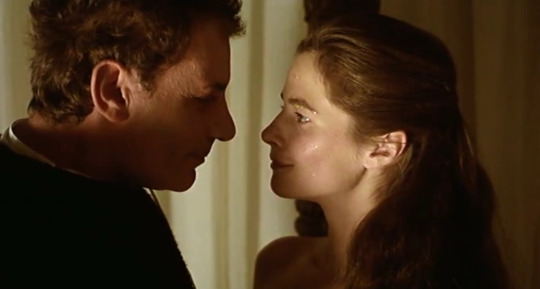
Giordano Bruno (1973)
#us!#jsuzggwsvusbshshvwgzgvshsbsjs#charlotte rampling#gian maria volonté#giordano bruno#giuliano montaldo#70s#giordano bruno 1973#mine
30 notes
·
View notes
Text
[1548 | 17 febbraio 1600]
«Giordano Bruno rappresenta la libertà di coscienza che al giorno d’oggi anche la Chiesa cattolica difende come un diritto inalienabile. Quando un Papa con un gesto simbolico percorrerà a piedi la strada che separa il Vaticano da Campo dei Fiori per deporre una rosa ai piedi della statua del filosofo bruciato vivo? Sarebbe un gesto che non significherebbe accettare completamente le idee e la filosofia di Bruno, ma un tributo dovuto a tutti i martiri del libero pensiero che la Chiesa nel suo passato ha perseguitato».
Vito Mancuso
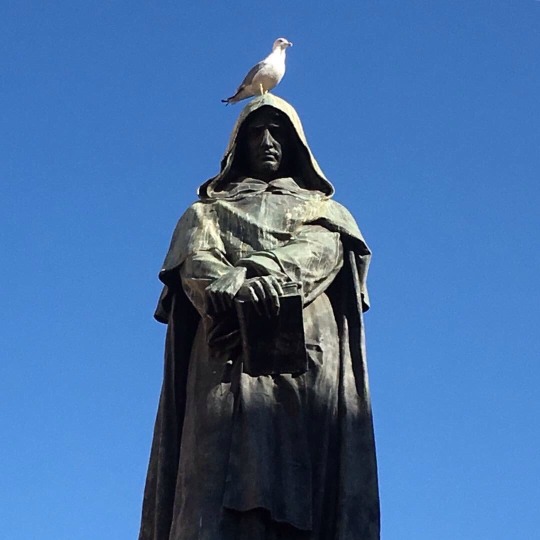
48 notes
·
View notes
Text
“Vi voglio raccontare una bella cosa, e farvi ridere: giocando con alcuni miei amici alle sorti, che toccava un verso per uno, a me toccò un verso dell’Ariosto che dice: “D’ogni legge nemico e d’ogni fede”.
Giordano Bruno
15 notes
·
View notes
Text
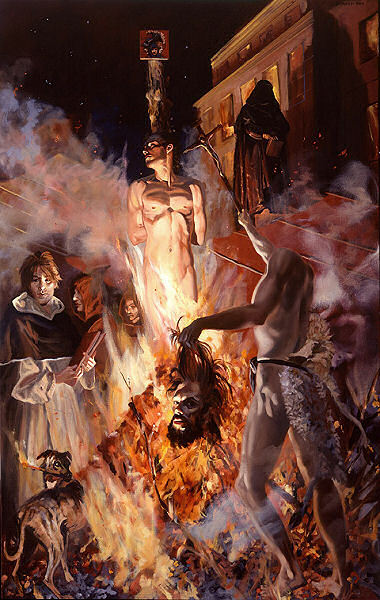
Giordano Bruno.
30 notes
·
View notes
Text
Divine love does not weigh down, nor carry his servant captive and enslaved to the lowest depths, but raises him, supports him and magnifies him above all liberty whatsoever.
The Heroic Enthusiasts
Giordano Bruno
35 notes
·
View notes
Photo
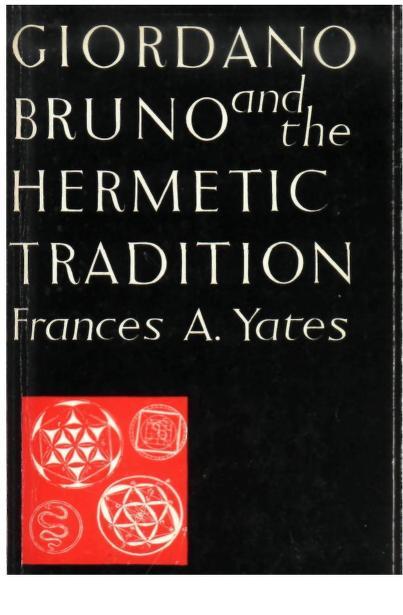
https://archive.org/details/francis-a-yates-giordano-bruno-and-the-hermetic-tradition/mode/2up
This book emphasises the primary importance of Hermetism in Renaissance thought. The Hermetic treatises were believed to be by an ancient Egyptian, prophet of Christianity; these associations strengthened their enormous impact on Ficino and the Neoplatonic movement. Pico della Mirandola yoked Hermetism with Cabalism and the Hermetic- Cabalist tradition continued as an "occult philosophy" both magical and mystical. Giordano Bruno is here for the first time placed within the context of this tradition of which he represents an original variation. He emerges as a Hermetic philosopher and magician with an unorthodox religious message. Even his support of Copemican heliocentricity is associated with Ficino's solar magic. This revolutionary reinterpretation pro¬ foundly affects our understanding of Bruno and of his death at the stake.
The Hermetic tradition is followed beyond the death of Bruno into the seventeenth century, particularly in Campanella. The correct dating in 1614 of the Hermetic treatises marked the end of the dominance of Hermetism though it continued to exert a hidden influence. The controversies of Fludd with Mersenne and Kepler arc seen as a conflict between a late revival of the Hermetic-Cabalist tradition and the seventeenth-century scientific movement.
32 notes
·
View notes
Text
"Non c'è armonia e concordia dove c'è unità,
e dove un essere vuole assorbir tutto l'essere;
ma dove c'è ordine e analogia di cose diverse;
dove ogni cosa serva la sua natura."
- Giordano Bruno
#giordano bruno#citazioni#frasi trovate per caso#frasi vere#frasi#quotes#frasi belle#citazioni libri#citazioni letterarie#filosofia#frasi di vita#philosophy#armonia#inclusività#diversità
13 notes
·
View notes
Text
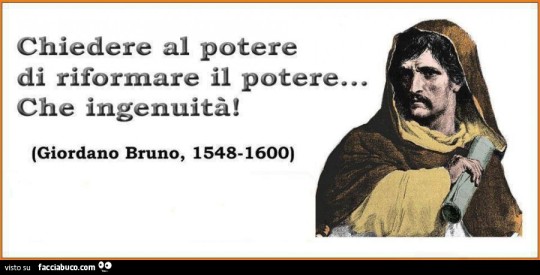
#potere#citazioni#giordano bruno#votazioni#politica#zombie#società malata#società#svegliatevi#manipolazioni#aprite gli occhi#illusioni#sistema#dittatura#schiavi#sanità mentale#responsabilità#matrix#ego
71 notes
·
View notes
Text
Campo dei Fiori by Czeslaw Milosz

Czeslaw Milosz, 30 June 1911 – 14 August 2004, 1980 Nobel Prize in Literature winner.
---
In Rome on the Campo dei Fiori
baskets of olives and lemons,
cobbles spattered with wine
and the wreckage of flowers.
Vendors cover the trestles
with rose-pink fish;
armfuls of dark grapes
heaped on peach-down.
On this same square
they burned Giordano Bruno.
Henchmen kindled the pyre
close-pressed by the mob.
Before the flames had died
the taverns were full again,
baskets of olives and lemons
again on the vendors' shoulders.
I thought of the Campo dei Fiori
in Warsaw by the sky-carousel
one clear spring evening
to the strains of a carnival tune.
The bright melody drowned
the salvos from the ghetto wall,
and couples were flying
high in the cloudless sky.
At times wind from the burning
would drift dark kites along
and riders on the carousel
caught petals in midair.
That same hot wind
blew open the skirts of the girls
and the crowds were laughing
on that beautiful Warsaw Sunday.
Someone will read as moral
that the people of Rome or Warsaw
haggle, laugh, make love
as they pass by the martyrs' pyres.
Someone else will read
of the passing of things human,
of the oblivion
born before the flames have died.
But that day I thought only
of the loneliness of the dying,
of how, when Giordano
climbed to his burning
he could not find
in any human tongue
words for mankind,
mankind who live on.
Already they were back at their wine
or peddled their white starfish,
baskets of olives and lemons
they had shouldered to the fair,
and he already distanced
as if centuries had passed
while they paused just a moment
for his flying in the fire.
Those dying here, the lonely
forgotten by the world,
our tongue becomes for them
the language of an ancient planet.
Until, when all is legend
and many years have passed,
on a new Campo dei Fiori
rage will kindle at a poet's word.
Warsaw, 1943
"Campo dei Fiori" from The Collected Poems 1931-1987 by Czeslaw Milosz. Copyright © 1988 by Czeslaw Milosz Royalties, Inc. Reprinted by permission of HarperCollins Publishers.
#poetry#poemsociety#poemblr#poem#poems and poetry#czeslaw milosz#campo dei fiori#david brooks#louis iribarne#the collected poems of czeslaw milosz#the collected poems 1931 to 1987#warsaw#rome#giordano bruno
2 notes
·
View notes
